This post contains affiliate links.
Can board games increase the student’s willingness to learn philosophy? They might have helped me consider Philosophy differently when I was in High School 😊.
Researching philosophy board games, I realized that there are different types of philosophy related board games:
- To introduce multiple concepts: I, Person, Philosophy, Philosophical Questions for Curious Minds
- That use philosophy as a theme: Philosophia
- About great thinkers: The Thinker Game, history as well as philosophy game.
- To introduce a specific concept: Difference (inequity), Eleusis (scientific method), Nomic (Democracy & laws), Hobbes (Life phases),
The type of game that you will use in your classroom or at home will of course completely depend on your objective.
Board Games that Introduce a Wide Array of Philosophical Concepts
I, Person (Wonder Ponder)
★★★★★

For Teachers & Families | Ages 8-15 | Author: Ellen Duthie | Price €
“I, Person ” is a beautiful and well thought out card deck. This collection of 14 cards is not exactly a game but is a very visually appealing and fun way of addressing 100 philosophical questions think about who we are and what we are with children.
” is a beautiful and well thought out card deck. This collection of 14 cards is not exactly a game but is a very visually appealing and fun way of addressing 100 philosophical questions think about who we are and what we are with children.
Here are some example of the questions addressed in the game:
- Are you absolutely sure you are a person?
- How do you know you are not really a robot?
- If you had more than one brain, would you be more than one person?
- What exactly is a person?
I highly recommend “I, Person”, as the question of identity is one of the important ones in philosophy, and is intriguing for children without being threatening, even in a family setting where opinions on some important matters might widely differ.
Philosophical Questions for Curious Minds (The School of Life)
★★★★☆
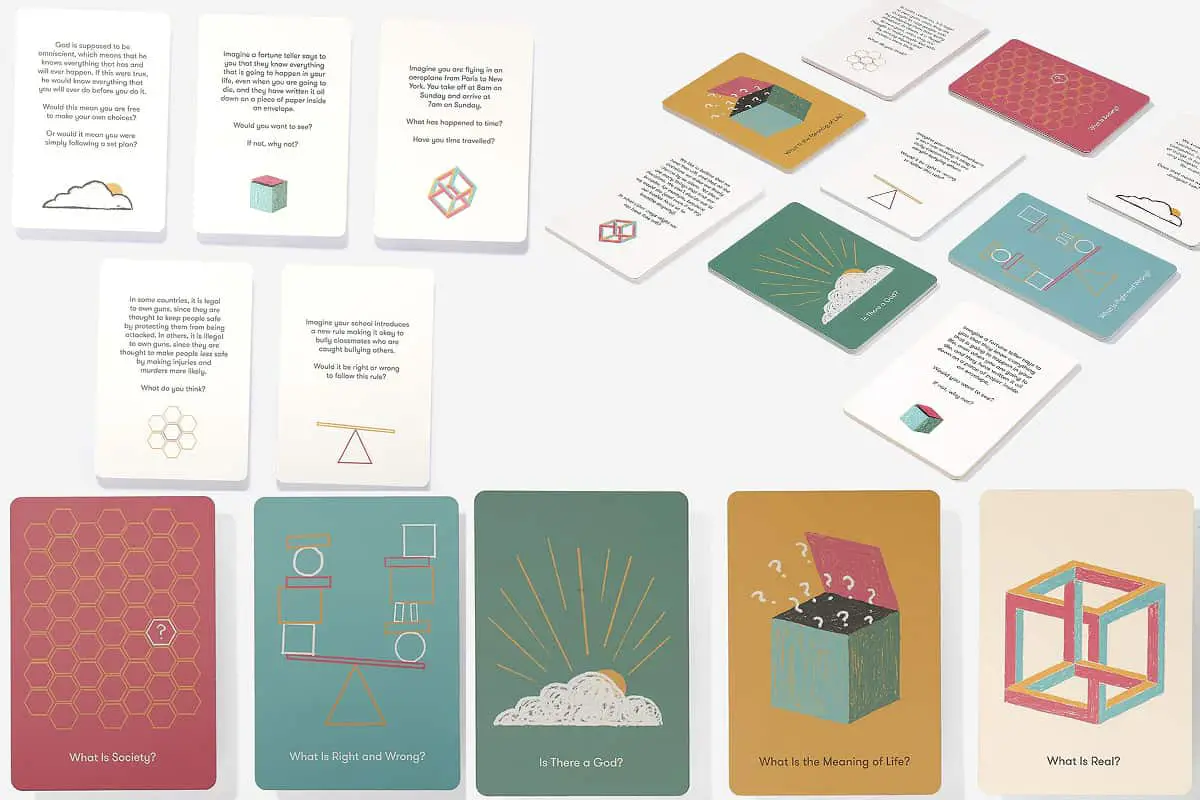
For Teachers & Families | Ages 8-10 | ££
Philosophical Questions for Curious Minds is a set of 52 large cards (flashcard size) with thoughtful philosophical questions for children (mostly).
is a set of 52 large cards (flashcard size) with thoughtful philosophical questions for children (mostly).
They are not meant to produce “right answers” but to trigger interesting family conversations (or even at school) – which they really do. No prior knowledge of philosophy is required the questions are expressed in a very general manner).
The cards cover five categories, and each question is fully detailed:
| Examples | |
| What Is Right and Wrong? (Ethics) | Imagine your school introduces a new rule making it OK to bully classmates who are caught bullying others. Would it be right or wrong to follow this rule? |
| What Is Real? (Metaphysics or just Physics) | Imagine you are flying in an aeroplane from Paris to New York. You take off at 8am on Sunday and arrive at 7am on Sunday. What has happened to time? Have you time traveled? |
| Is There a God? (Theology) | God is supposed to be omniscient, which means that he knows everything that has and will ever happen. If this were true, he would know everything that you will ever do before you do it. Would this mean you are free to make your own choices? Or would it mean you are simply following a set plan? |
| What Is Society? (Political philosophy) | In some countries, it is legal to own guns, since they are thought to keep people safe by protecting them from being attacked. In others, it is illegal to own guns, since they are thought to make people less safe by making injuries and murders more likely. What do you think? |
| What Is the Meaning of Life? | Imagine that a fortune teller says to you that they know everything that is going to happen in your life, even when you are going to die, and they have written it all down on a piece of paper inside an envelope. Would you want to see? If not, why not? |
Board Games to Introduce Specific Philosophical Concepts
Difference: A Philosophy Game (Center for Philosophy for Children, University of Washington): Inequity
★★★★★
For Classrooms | Ages 14+ | several tables of 3 players | [FREE] Printable game
Difference is a very clever negotiation game for the classroom aimed at promoting discussion about inequity.
for the classroom aimed at promoting discussion about inequity.
It is a tournament game played by several tables of 3 players, each playing a different role (Green, Purple, Yellow). For each role, the objective is to win the tournament (have the most stones compared with other players in the same role).
Each group starts with a pool of 9 stones and a supply area of 21 stones (at the middle of the table). The game lasts 7 rounds. At their turn, players can perform one action, depending on their role:
- Take stones from the Pool
- Transfer stones from the Supply to the Pool
- Give stones to another set player
- Transfer all stones from Pool to Supply
The possible actions are designed so that:
- Yellow receives stones from other players and cannot take them from the pool, but he can “Ruin the game” by transferring all Pool stones to the Supply
- Green can be more self-serving than Purple (drawing from the pool), but Purple can be more generous (giving more stones to Yellow)
To succeed, players, therefore, need to cooperate. Yellow can win only if others agree to help him, but the others need to help him if they do not want him to ruin the game for everyone.
The roles work a bit like the relation between employers and employees. Employers earn the money and decide how much they “pay” employees, but employees can “strike” if they are not getting paid enough.
I highly recommend “Difference”, which is a very clever way of introducing meaningful discussions about how society works.
By the way, there are several interesting variations!
Eleusis & New Eleusis: The Scientific Method
★★★★☆
For Teachers & Adults | Ages 14+ | Players: 4-8 | Author: Robert Abbott | Regular playing cards (2 decks)
Eleusis (and New Eleusis, a later version) is a card game played with two decks of playing cards that illustrates the scientific method.
(and New Eleusis, a later version) is a card game played with two decks of playing cards that illustrates the scientific method.
One player, “God”, invents a rule that governs the order in which cards can be played. Usually, the rule is based only on the most recently played card(s). For example, the rule could be one of the following:
- Alternate between even and odd numbers (where Jack=11, Queen=12, King=13).
- Alternate between cards that are higher than the last one and lower than the last one played
- Alternate between the 4 colors (that is never twice the same color)
The other players (“Scientists”) try to be the first to guess the rule.
They initially get 14 cards. They take turns playing one or more cards (“experiments”) which are accepted by “God” if the rule is met or refused if the rule is not met.
The correctly played cards are put on the table faces up as the top raw. Incorrectly played cards are put on the table below the first row. This way, players always know every card that was played, and which were right or not right.
A player who thinks they cannot play a legitimate card:
- Declares a “no play” and disclose their hand.
- Discards it and draws a 4 card smaller one if God confirms he/she is correct
- Otherwise gets 5 penalty cards
In “New Eleusis”, a Scientist with a hypothesis can become a “prophet” who predicts the results of experiments instead of God. Other players have 10 cards to find experiments whose results are not correctly predicted by the Prophet. In this case, they become prophets themselves. Players can also be excluded from the game if they make mistakes after a certain number of cards have been played.
You can find more explanations about the game on Wikipedia or BoardGameGeek
or BoardGameGeek .
.
Eleusis is really a timeless game that illustrates a universal principle in a simple way. It can be used for a philosophy course as well as for a science class.
Eleusis Express
★★★★☆
For Teachers | Ages 9+ | Players: 4 | Author: John Golden
Eleusis Express is a simplified and quicker version of Eleusis meant to illustrate the scientific method to elementary-school-aged children.
The rules of Eleusis Express are the same as for Eleusis, except that:
- Scientists start with twelve cards
- Only one card can be played at a time
- No play
- If correct, get a new hand with one card fewer
- If incorrect, two penalty cards
- There is no prophet and no exclusion.
- A player can say what they believe to be the rule after any correct play.
- The game is played until a Scientist empties their hand or guesses the rule correctly
Scoring for Eleusis Express is as follows:
- Scientists score 12 points minus 1 point for each of the cards remaining in their hand.
- Scientists who depleted their hand scores a 3-point bonus.
- A Scientist who successfully guessed the rule scores a 6-point bonus.
- God scores the same as the highest-scoring player.
Nomic: How Democracy Works
★★★★☆
For Teachers & Adults | Ages 14+ | Players: 4+ | Author: Peter Suber
Nomic is a one-of-a-kind game, a game in which changing the rules is a move. You can change the rules of the game during the game, using a democratic voting mechanism (which can also be changed).
Playing Nomic can be used to show in a practical (even if stereotypical one) way:
- How our society’s rules can evolve (or even the rules of our life)
- How introducing of changing rules can create loopholes in a judicial system
- How the careful consideration of new rules (or any change of existing rules) is essential to avoid creating political instability (some variants of the game such as ThermodyNomic and B Nomic explore this aspect of the game)
It can be used to introduce interesting discussions about how democracy works and how stable it really is when there are not enough checks in place, or when some participants (politicians for example) attempt to “game” the system.
Nomic was popularized in 1982 in a column in Scientific American (the science magazine) and later improved as a chapter of Peter Suber’s “The Paradox of Self-Amendment ”, book. The thesis of the book is that a law that states how to change laws could be applied to itself and authorize its own amendment.
”, book. The thesis of the book is that a law that states how to change laws could be applied to itself and authorize its own amendment.
The game soon took a life of its own and still gathers (with its many variants) a whole community of players around it.
Suber’s rules are divided into:
- Immutable rules must be changed into mutable rules before they can be modified or removed. They also take precedence over mutable ones.
- Mutable rules, which can be changed or removed
A rule change consists in:
- Adding a new mutable rule
- Changing or repealing a mutable rule
- Changing a rule from mutable to immutable, or from immutable to mutable
There are numerous variants of the original game, where for example the rules are initially determined by a dictator rather than a democratic process (and the process can be changed during the game), or the game is combined with Monopoly or Chess.
Note though that playing Nomic is complex and “not for the faint of heart”, and because of this takes a pretty long time to play.
If you are interested to know more about Nomic, there are many resources available. Here are a few of them:
The Wikipedia “Nomic” article: https://en.wikipedia.org/wiki/Nomic
Nomic Game: https://wiki.c2.com/?NomicGame
The initial set of rules: http://legacy.earlham.edu/~peters/writing/nomic.htm#initial%20set
Hobbes – A Board Game about Life (Human Nature Games)
★★★★☆
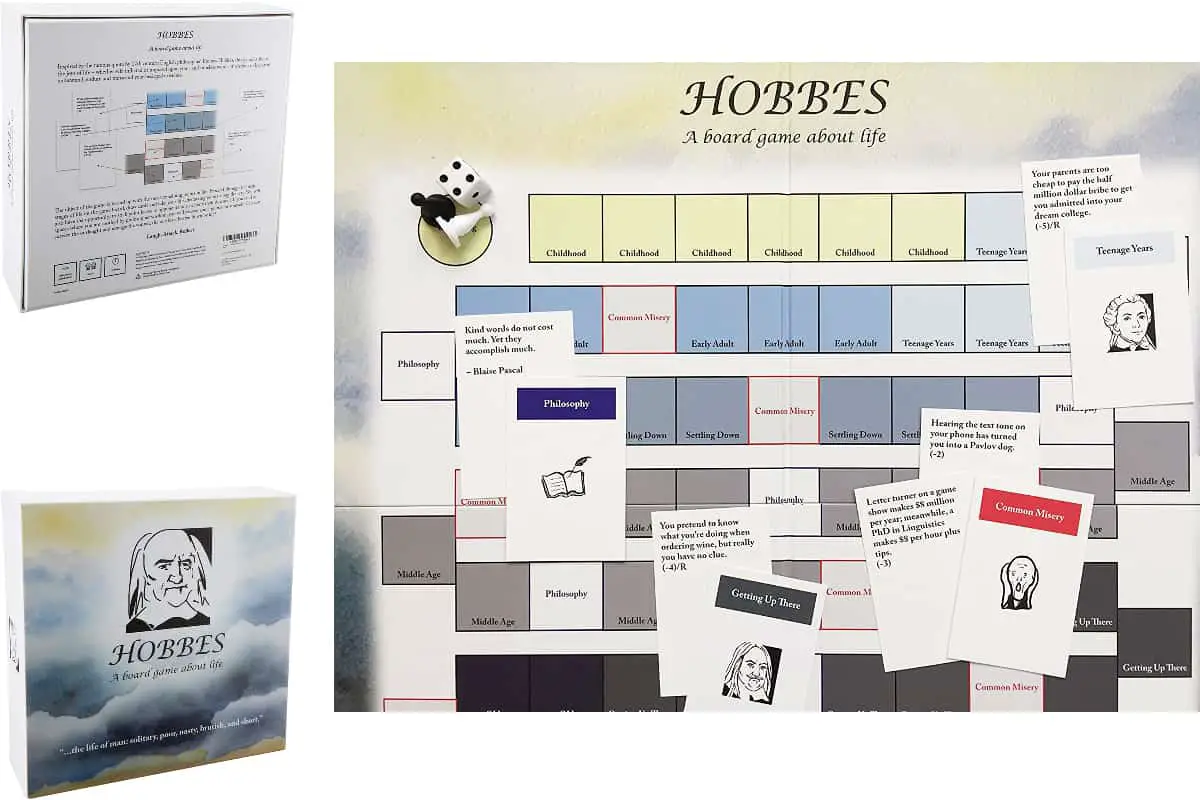
For Adults | Ages 18+ | Price $$$
“Life is solitary, poor, nasty, brutish, and short.” – 17th-century philosopher Thomas Hobbes
HOBBES is a party game about events that occur during different stages of our lives. It is aimed at building a philosophical perspective on life thanks to quotes from great thinkers, particularly to help deal with unwelcome realities.
is a party game about events that occur during different stages of our lives. It is aimed at building a philosophical perspective on life thanks to quotes from great thinkers, particularly to help deal with unwelcome realities.
The objective of the game is to end up with the most remaining points after being progressively diminished by life’s events.
The game contains 330 cards.
Life Stage cards describe (with humor and sarcasm) things that afflict individuals during 7 phases of their lives, from Childhood to Old age. You proceed through life stages on the board, drawing these cards and deducting points.
You can also:
- Give negative points to opponents, with “redirect” cards (to one opponent) or to several opponents with “Common Misery” cards that describe problems experienced regardless of life stage
- Gain points with “philosopher wisdom” cards
These possibilities make the game more fun and create interaction between players during the game.
I give four stars to this game because:
- The questions are detailed enough to define very clear situations that create a real focus for the discussions
- It is very good to have
I would not recommend it for middle school children or teenagers but rather for adults. Many answers to these questions highly depend on supporting facts and scientific evidence that is not provided. Having some philosophical background knowledge provided helps to appreciate the game.
Philosophy: The Game
★★★☆☆
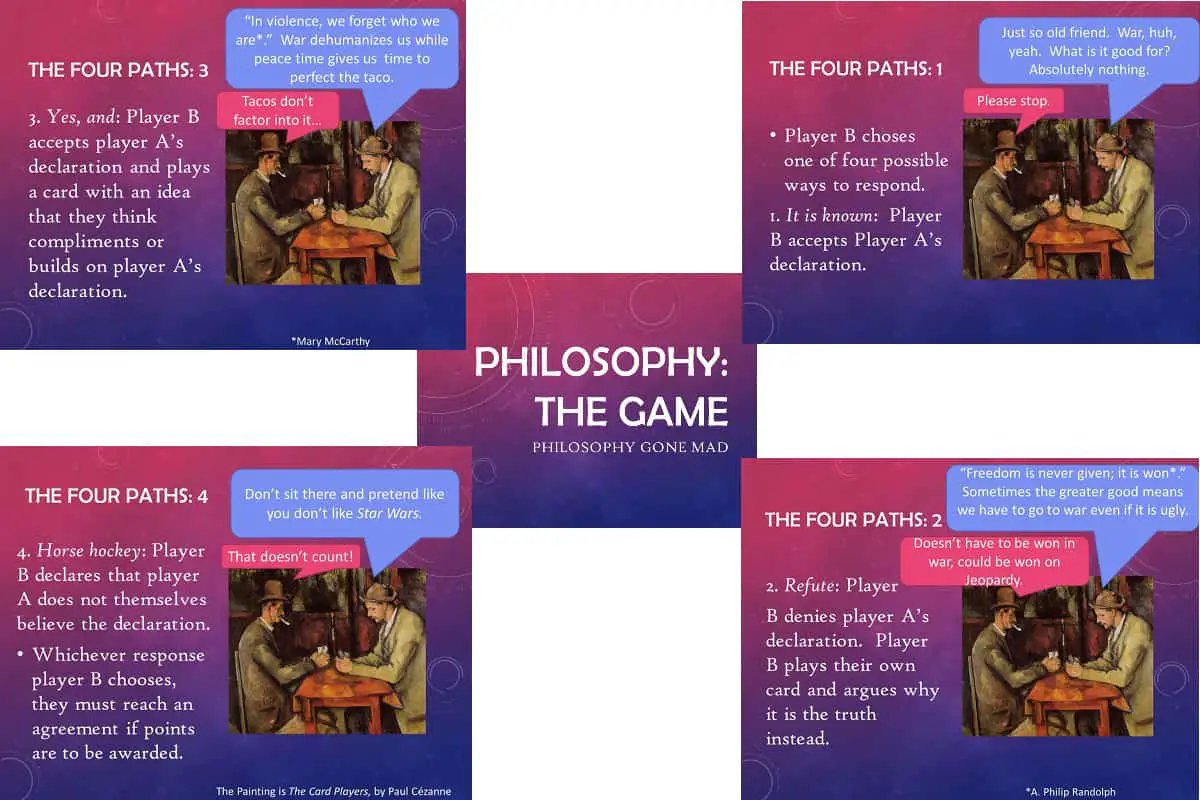
For Adults | Ages 14+ | 4 or more players | Author: J.A. Faust | Price $$$
Philosophy: The Game : is a Kickstarter-backed party card game (312 cards) that dealt with ideas from philosophers and other known figures (unfortunately the game is not available anymore).
: is a Kickstarter-backed party card game (312 cards) that dealt with ideas from philosophers and other known figures (unfortunately the game is not available anymore).
I mention it in this list though, as it is easy for you to create your own version of the game.
Each card has a quote from a well know figure (philosopher, author, activist…). Here are some examples of quotes:
- There never was a good war, or a bad peace – Benjamin Franklin
- Freedom is never given; it is won – Philip Randolph
- In violence, we forget who we are – Mary McCarthy
- Earthly knowledge is but a shadow – Plato
- Truth resides in the world around us – Aristotle
- You move totally away from reality when you believe that there is a legitimate reason to suffer – Byron Katie
- Every sexual position is fundamentally comic – Judith Butler
Principle of the game:
- Each player is dealt cards they keep secret
- Player A lays down one card and briefly explains why they think the philosophical quote on the cards is true
- Player B chooses one of four ways to respond:
- Accept the other players’ declaration
- Refutes by playing one’s own card and arguing why it is the truth instead
- Yes, and: accept and plays a card that complements the other player’s declaration (and explain why)
- Horse Hockey: declare that the other player does not believe in their own declaration
- In any case, the two players have to reach an agreement, or the other players have to decide who wins for each “duel”
I like the idea of the game for many reasons:
- Very simple principle
- Can be customized with other series of quotes
- Creates debate and interactions
- Uses the player’s imagination
- Fosters collaboration with the “Yes, and” option
All this is great, but the is one caveat: you must make a careful selection of the quotes so that they can be used together to complete or contradict each other. This means that it is better to group quotes by relatedness and play with related quotes.
Philosopher Quest’s Game (Real Science 4 Kids)
★★☆☆☆
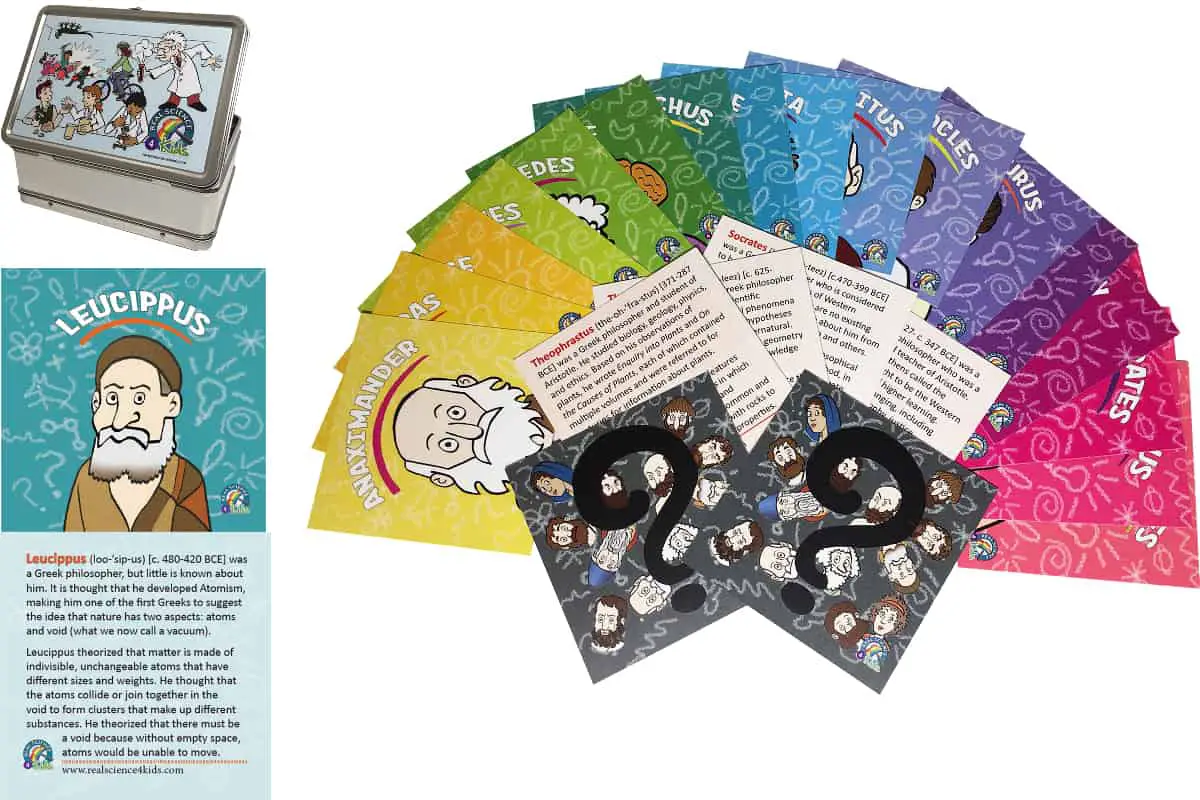
For Teachers | Ages 14+ | 2 players | Price $$$
The “Philosopher’s Quest ” card game is an attempt at actually learning some philosophy knowledge through quizzes about ancient philosophers.
” card game is an attempt at actually learning some philosophy knowledge through quizzes about ancient philosophers.
It contains 21 philosopher cards with historical data, and 21 question cards.
This game could be more enticing with a better graphic design, and a more complete set of questions. As it is, it falls short of being really worth it in my opinion.
Board Games that Use Philosophy as a Theme
Philosophia: Dare to be wise (Cogito Ergo Meeple)
★★★★☆
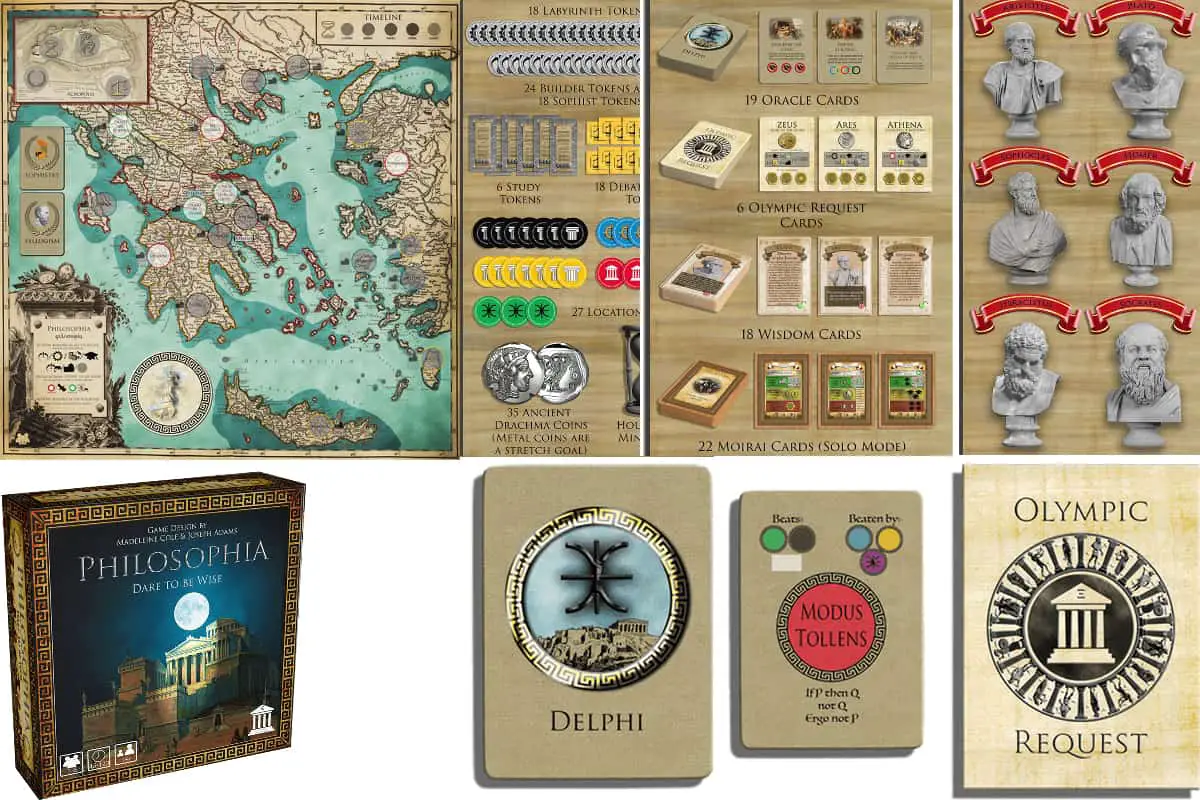
For Teachers & Families | Ages 14+ | 1-6 players | Price $$$$
Philosophia is an elaborate strategy board game that uses ancient Greek Philosophy as its theme. It was initially released as a Kickstarter project
is an elaborate strategy board game that uses ancient Greek Philosophy as its theme. It was initially released as a Kickstarter project .
.
The game is so well designed that you will probably feel like knowing more about the philosophers involved in the game as well as about the ancient Greece era.
Each player plays the role of a different philosopher (Socrates, Plato, Sophocles, Heraclitus, Homer, or Aristotle). Their objective is to become the greatest philosopher by the end of the game. To achieve this, players at their turn can choose between several different types of actions:
- Build a following
- Build schools dedicated to their philosophy
- Tutor to earn money
- Debate with other philosophers using sophistry & syllogism cards that describe thinking principles and logical fallacies (a battle mechanism determines which thought process wins). This is a really clever way to actually learn something valuable while doing the battle.
- Unlocking wisdom cards: they feature quotes of philosophers plus a nice explanation of their context. This is great for introducing some knowledge of Greek philosophy to the players
- Gain the favors of oracles
- Progress on the timeline
The gameplay is fast-paced as players’ turns do not last long, which makes the game more interesting.
Because Philosophia makes such a great job at creating interest in this complex topic, I highly recommend it.
There are good video reviews about the Philosophia, that you can watch if you want to know more:
Plus, there is the following detailed “How to play” videos from the original Kickstarter project:
(and there is another for the solo mode)
Board Games about Philosophers and Other Thinkers
The Thinker Game (School of Life)
★★★☆☆
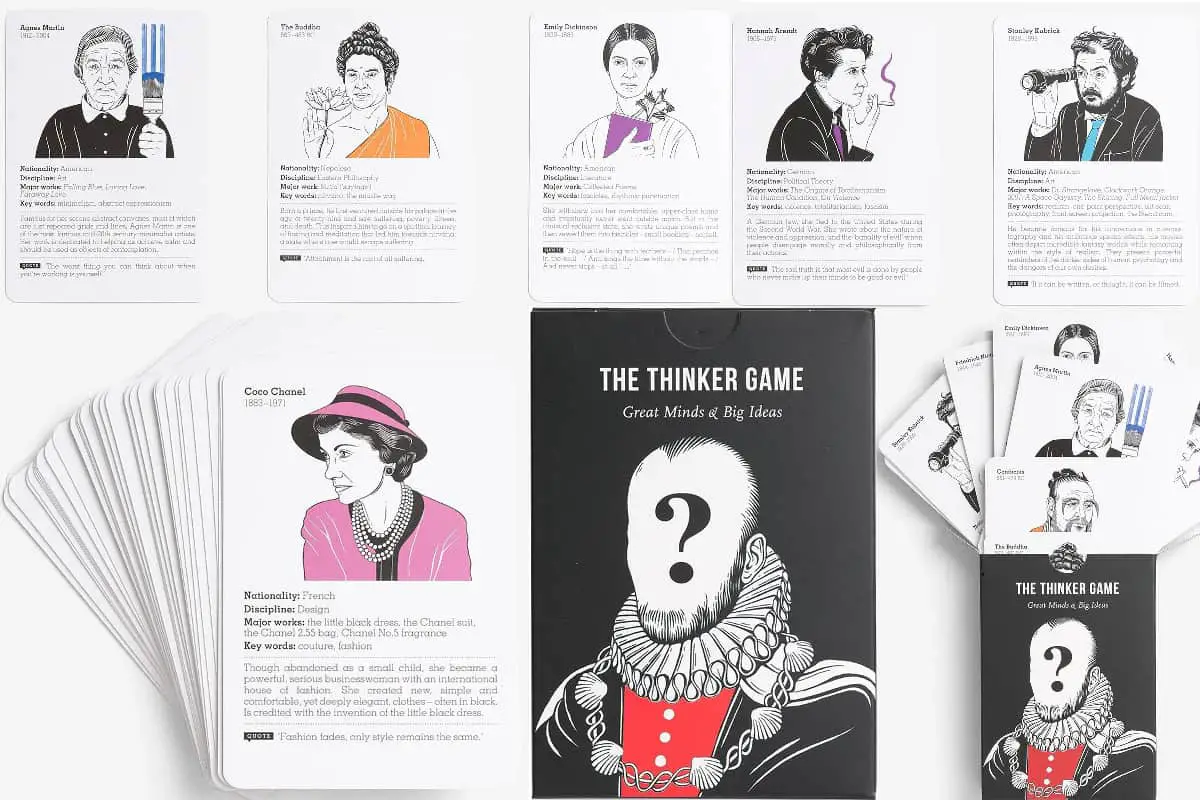
For High School, Adults | Ages 16+ | Price $$
The Thinker Game is a quiz-style 52 card game to test the player’s knowledge of a selection of history’s great thinkers. Each card provides the following information and an illustration (very well done) of the thinker:
is a quiz-style 52 card game to test the player’s knowledge of a selection of history’s great thinkers. Each card provides the following information and an illustration (very well done) of the thinker:
- Name
- Timeline
- Nationality
- Major work
- Keywords
- A very short summary of their work & life
- Quote
Thinkers belong to many different domains:
- Philosophy: Marcus Aurelius, Simone de Beauvoir, Buddha, Confucius, Epicurus, Montaigne, Nietzsche, Plato, La Rochefoucauld, Rousseau, Sartre, Sen yo Rikyu
- Science, Psychology, Sociology, Political Theory: Rachel Carson, Da Vinci, Freud, Machiavelli…
- Anthropology: Margaret Mead, Jane Goodall
- Architecture: Le Corbusier, Eileen Gray, Oscar Niemeyer
- Art & Design: Coco Chanel, Barbara Hepworth, Alfred Hitchcock, Stanley Kubrick, Agnes Martin, Henri Matisse, Georgia O’Keeffe, Cy Twombly, Johannes Vermeer, Leonardo da Vinci
- Literature: Jane Austen, Emily Dickinson, Marcel Proust, Sappho, William Shakespeare, Leo Tolstoy, Virginia Woolf
Players try to guess thinkers by asking ‘yes/no’ questions or requesting hints.
But you can use this card game in other creative ways.
For example, as there is timeline information (birth/death), you can play a “Timeline” type game where players have to find where a thinker is located in the historical timeline compared to the other thinkers.
An important point to mention is that The Thinker Game should not be played without some preparation. To make the game interesting, the players should know at least half of the thinkers:
- Either play it with people who already have a rather broad culture and are interested to widen it further
- Or, if you are doing this at school, introduce these thinkers in some way in your course beforehand (or at least 70% of them), and play the game afterward as a means of making this new knowledge stick. This is not easy to do though as the thinkers are from very different domains, and span different historical periods
Edudingo.com is a participant in the Amazon Services LLC Associates Program, an affiliate advertising program designed to provide a means for sites to earn advertising fees by advertising and linking to Amazon.com. We also participate in other affiliate programs which compensate us for referring traffic.

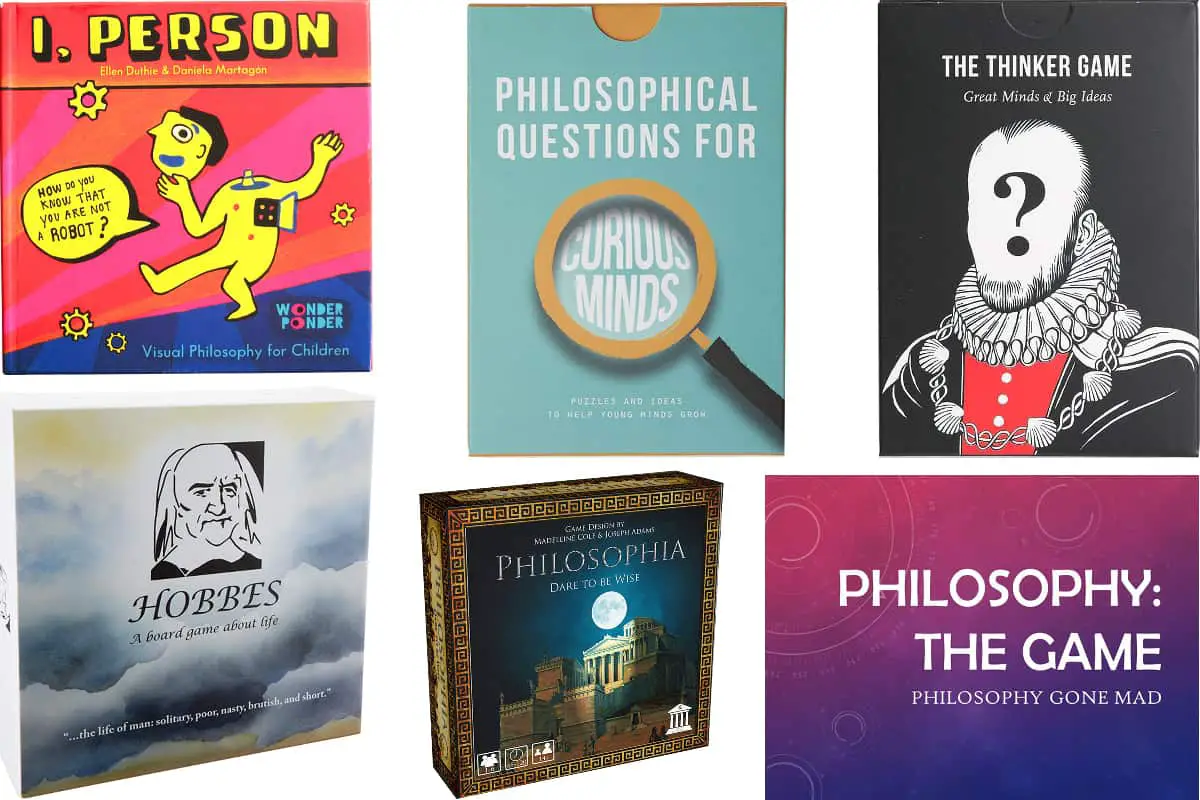
Hi Francois,
I am the creator of Hobbes. Thank you for posting your review of the game, although I wish you didn’t write that you don’t recommend it for adults (insert slightly sad face emoji). My target audience is educated adults, roughly 35-55 yrs old, who have a sense of humor about life, with all its pitfalls and traps. Anyway, the main reason I am writing this note is that I noticed that these last two lines on your Philosophy page (before your pic and bio) seem to have been misplaced. I think you meant to place them as the last two lines in the section about my game.
[The objective of the game is to end up with the most remaining points after being progressively diminished by life’s events.
The game contains 330 cards.]
Thanks again for including my game in your website.
Cheers,
Evan
Hi, your games look interesting. The only game I’ve seen is philosophy for curious minds. I thought they were a good questions for children.
My friend and I have been working on a philosophy game for about a year now, and are just about to start trial testing. Any advice on any of the following would be appreciated would be appreciated: self publishing, publishing companies, copyrights, trial testing etc. thanks in advance.
Hi Glen,
Whether you chose to opt for self-publishing or look for a publisher is really a personal choice!
Whatever the choice, making lots of user testing is highly recommended to make sure that your game is both relevant for your audience and works as well as intended.
That reminds me that I should publish some posts on game design best practices someday!
Best regards
François